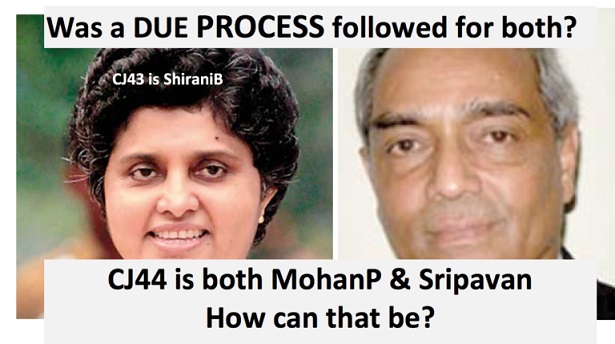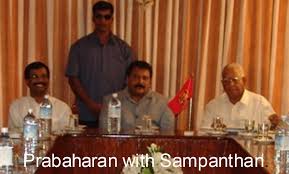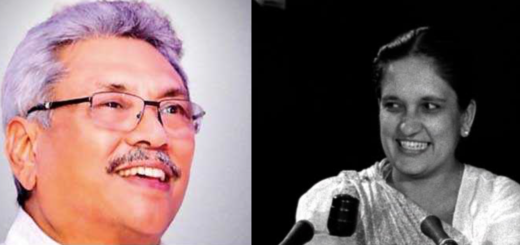Exposing the hypocrisy of the champions of ‘Rule of Law & Democracy’: Removal of a Chief Justice in Sri Lanka

The CHANGE that came in January 2015, let us all recall, came as a result of a campaign that concentrated on highlighting the corruption & lack of good governance by the previous government. Naturally, those that voted for the CHANGE expected good governance. We take the example of the removal of 2 Chief Justices & leave it to you to determine who followed due process & who was treated unfairly & the hypocrites & hypocrisies that prevail. International outcry for one CJ & unabashed condemnation for another.
What is important in discussing this topic is not to consider the pros & cons of the person, we are not going to consider any of their judgements, or even legal loopholes or other matters. We are not even going to evaluate the trial but we are only going to be concerned about whether a due process was followed for the removal of a Chief Justice. You can determine whose removal followed a process (even some sort of process) & whose removal did not.
Our next question is, how can the removal of one Chief Justice get international attention & the removal of the other Chief Justice be completely ignored, because we are dealing with countries who present themselves to be beacons of rule of law & good governance?
Removal of CJ43 & Removal of 44
Chief Justice 43 (Shirani Bandaranayake)
Appointed on 18 May 2011 by then President Rajapakse.
It was against this Chief Justice that an impeachment motion was brought in November 2012.
Did the Government comply with provisions in the Constitution & Standing Orders for the removal of CJ 43?
Did the Government follow Articles 107(2) & 107(3) of the Constitution that sets the procedure to be adopted to remove a Chief Justice, President of the Court of Appeal or any other judge of the Supreme Court & Court of Appeal on ‘grounds of proved misbehavior or incapacity”?
Was there a resolution presented to Speaker or placed on the Order Paper of Parliament signed by 1/3 of total members of Parliament giving the alleged misbehavior or incapacity?
Was such a resolution given to the Speaker – 78A(1) to act in accordance with Article 107 of the Constitution?
Thereafter, did the Speaker accept the resolution & place it on the Order Paper of Parliament & appoint a Select Committee of not less than 7 members to investigate & report to Parliament on the allegations against the Chief Justice?
Did the Select Committee hand over to the Chief Justice a copy of their deliberations & seek a written statement of defense from the Chief Justice?
Was an opportunity given to the Chief Justice to appear before the Select Committee to give her version?
Did the Select Committee take a month to conclude their findings as is required
Was the findings & decision presented to the President by the Speaker on behalf of the Parliament?
The answer to all the above questions is YES – every required procedure was followed.
The previous government followed all of the above procedures. 117 MPs of Parliament handed over a petition on 1stNovember 2012. Standing Orders of Parliament & Constitution was upheld. A 11-member Select Committee was appointed on 14 November 2012 comprising – Anura Priyadarshana Yapa (Chairman) Nimal Siripala de Silva, Susil Premajayantha, Rajitha Senaratna, Dilan Perera, Wimal Weerawansa, Neomal Perera, John Amaratunga, Lakshman Kiriella, Vijitha Herath, R Sampanthan.
Their report was handed over on 8 December 2012. It was debated in Parliament on 10th & 11 January 2013 & passed by 155 votes in favor 49 against on 11 January 2013.
In conclusion, what needs to be clearly accepted is that every legal & constitutional provision & procedure was followed.
1st November 2012 a petition was handed over & on 11th January 2013 Parliament voted for the impeachment. (almost 2 ½ months was taken for the due process)
Let’s look at the international response
18 January 2013 United Nations High Commissioner for Human Rights Navi Pillay said impeachment “further eroded the rule of law in the country and could also set back efforts for accountability and reconciliation”
15 November 2012 Commonwealth Secretary General Kamalesh Sharma issued 3 separate statement denouncing the impeachment “The dismissal of the Chief Justice will be widely seen..as running counter to the independence of the judiciary, which is a core Commonwealth value.”
18 January 2013 European Union – High Representative of the Union for Foreign Affairs and Security Policy Catherine Ashton “the independence of the judicial branch cannot be made subject to actions by any other branch of government”
11 January 2013 Canada – Foreign Minister John Baird “highly politicized, lacking basic transparency and respect for the guarantees of due process and fair trial”
11 January 2013 United Kingdom – The Foreign and Commonwealth Office “respect democratic principles”
2 November 2012 United States – The United States Department of State “guarantee due process, and to ensure that all investigations are conducted transparently and in accordance with the rule of law”.
15 January 2013 State Department spokesperson Victoria Nuland expressed concern about the impeachment’s impact on the democratic process, saying “we were concerned about the perception of reprisals against somebody for independent thinking and action”
6 December 2012 International Commission of Jurists (ICJ) stated that the impeachment process ignored “international standards and practice”
On 15 January 2013 ICJ issued a statement which condemned Mohan Peiris’ appointment as chief justice, describing it as a “further assault on the independence of the judiciary” and called for Bandaranayake’s re-instatement
23 January 2013 44 senior judges and jurists from around the globe wrote an open letter to President Rajapaksa which condemned Bandaranayake’s removal, urged her re-instatement, saying that the impeachment was “in contravention of the Constitution, international human rights law and standards, including the right to a fair hearing, and the rule of law”
Removal of Shirani was void from the beginning- Saliya Pieris (Chairman Missing Persons Commission)
As you can see by the statements – not only are they intrusive, interfering but they are demanding a sovereign government to install their persons to positions while they have no qualms to denounce people who do not fall into their gambit of preference.
Locally too, lawyers, accountants, engineers, civil society, all claimed the impeachment as unfair. There were even public polls & surveys. Given that these professionals are taking a stand not in favor of the person but the process of impeachment, our next question is why did the same groups not cry foul over the removal of CJ44? How can they as professionals favor CJ43 or CJ44? How professional is this? If the argument is about fair trial – CJ43 had a trial but did CJ44 have any trial against him?
Keep these thoughts in mind when we next look at how CJ44 was removed now that you are aware of the process followed for the removal of CJ43
CJ43 impeached on 11 January 2013 and CJ44 appointed on 15 January 2013.
9th January 2015 the government changed.
28 January 2015 the President’s Secretary by letter informs CJ44 quoted void ab initio to claim his position as CJ was considered null & void as it was never valid from the beginning.
There was no resolution conforming to Article 107 passed in Parliament starting a process for CJ44’s removal as was seen in the procedure followed for removal of CJ43.
January 2015
- A group of lawyers protested at Hulftsdorp demanding CJ44 step down from office
- They gave CJ44 48 hours to step down as CJ
- CJ44 was not allowed into his Chambers
- 28 January 2015 Secretary to the President sends letter to CJ44 claiming his position as void ab initio & thus his removal.
- 28 January 2015 CJ43 was reinstated for only a day & made to resign the same day
- 30 January 2015, Justice K. Sripavan was appointed Chief Justice. Ironically, he is included as CJ44 not CJ45.
Question is can the President alone remove the Chief Justice at his will & that too through a letter sent by his secretary?
If international & local groups clamored to claim CJ43 was dismissed unfairly why did the same groups not come forward to do the same for CJ44? He was simply not allowed into his chambers then delivered a letter that he was never considered the CJ – how fair is this? Is this how a country’s CJ is removed from office? So where were all the parties that were quoting the laws & international standards on removing a CJ.
A victim is a victim irrespective of the face! So where were these unbiased, impartial, rule of law, due process, upholders of law & constitution for victim CJ44?
Anyone debating this – please keep to the main facts. Was a procedure followed for the removal of CJ43 & CJ44? Irrespective of any legal loopholes. Was there a process that was followed for both?
As you can see there was blatant bias & it is so obvious in the statements issued internationally & by their local representatives.
CJ43 is ShiraniB
CJ44 – MohanP & Sripavan (we have 2 CJs)
CJ45 – Priyasath Depp
CJ46 – Nalin Perera
Additionally, if void ab initio term is used it next raises another more important question of the legal validity of every judgment made by CJ44 from his appointment in January 2013 to his removal in January 2015? When this question arises – Sri Lanka is in for bigger problems.
Moreover, how can there be two CJ44? The scenario reminds of the present tassel of 2 PMs and we know the procedure that was followed for the removal of the former PM by gazette which again was not followed when he became PM in 2015 & the sitting PM was not removed. But, where was the ‘rule of law, democracy, due process’ bandwagon during these legally & constitutionally questionable incidents?
This selective & partisan approach by the usual culprits is really embarrassing them. Not that they are bothered about gaining credibility of the people so long as their agendas are fulfilled. But their rhetoric in pretending to be upholders of good governance is turning their statements into an international farce & soon they will come a time they will not be taken seriously whatever campaigns they fund. While all these bias & international reactions fall under the gambit of intervention & interference into the internal/domestic affairs of a sovereign state, it is our duty to highlight these violations & leave it for you the reader to decide.
Shenali D Waduge







